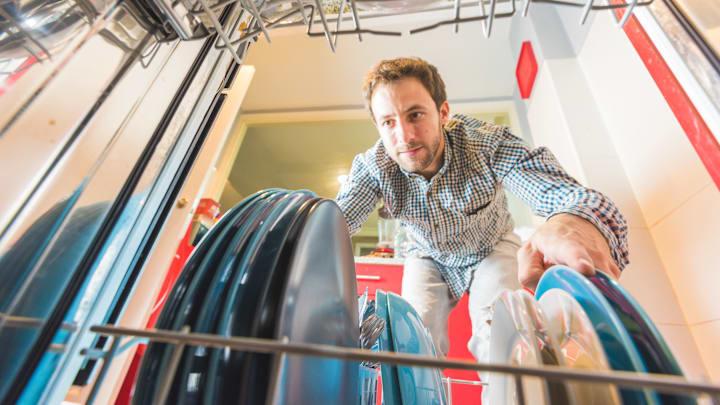Dishwashers are one of the great conveniences of the modern age. Rather than spend an hour hunched over your sink scraping hardened tomato sauce off a plate, you can feed your filthy dinnerware to an automated appliance, leaving you free for important things like binge-watching Love Is Blind or doom-scrolling on your phone.
But while dishwashers are good for most things, they’re not ideal for all things. Check out 11 kitchen items you should never load into your dishwasher.
- Knives
- Cast Iron Skillets
- Wooden Cutting Boards
- (Some) Fine China
- Crystal
- Cheap Plastic
- Aluminum Cookware
- Insulated Mugs
- Nonstick Pans
- Serving Pieces
- Food Thermometers
Knives

Silverware is fine for automated cleaning, but you should consider knives to be the exception. Exposure to moisture and heat, along with water pressure, can dull the blade; if it’s got a wooden handle, it can also rot. And if the knife somehow frees itself from its tiny basket prison, it could wind up damaging the interior of the washer.
Cast Iron Skillets

These durable pans get better with age—unless you subject them to the harsh environment of a dishwasher. The indiscriminate blasts of water and heat can strip them of their seasoning, the oil coating that helps maintain their nonstick surface. You’ll need to clean them by hand the right way.
Wooden Cutting Boards

You don’t want to expose wood to extreme heat and soaking water, which means wooden cutting boards should be washed by hand. If you chuck them in the dishwasher, you risk warping and cracking, which not only reduces the life of the cutting board but may create cozy spots for bacteria to reside in. While you’re at it, avoid washing wooden utensils, bowls, and rolling pins in the appliance for the same reason. But you can actually throw plastic cutting boards in the dishwasher.
(Some) Fine China

Despite its reputation for being delicate, fine China dinnerware is dishwasher safe—if its pattern is located underneath the glaze. You can tell by using your fingers to feel for bumps. If they’re palpable, that means they’ve been applied over the surface, and you shouldn’t risk it. If the dish is smooth, it should be fine. Just use the light or China cycle option and stick to powdered detergent rather than pods or liquids, which might be too concentrated for a delicate wash.
Crystal

The aesthetic appeal of crystal comes at a price. Because lead oxide is added to glass to make it soft enough to etch, high heat and unfiltered water might leave a permanent haze. It can also easily chip when exposed to high water pressure.
Cheap Plastic

Your ultra-durable storage containers might survive a dishwasher, but cheaper, thinner plastic likely won’t. You run the risk of it melting or warping.
Aluminum Cookware

Stainless steel is fine, but avoid putting aluminum pots and pans in the dishwasher. A cycle will likely lead to discoloration in the material.
Insulated Mugs

Vacuum-sealed insulated mugs and cups hold temperature by maintaining a void between the inner and outer layers. It works for hot and cold beverages, but the trade-off is that most of them aren’t dishwasher-safe. The vacuum seal can be damaged, rendering them useless for insulation.
Nonstick Pans

A nonstick pan might say it’s dishwasher-safe, but repeated beatings in the appliance will wear away at the coating over time. The chemicals in these surfaces can leach into your food. Better to wash them by hand instead. This also holds true for air fryer baskets, which normally have a nonstick surface.
Serving Pieces

Anything that resembles a family heirloom should be washed by hand. Ceramics, stoneware, pewter, or anything with a gold trim qualifies.
Food Thermometers

Food and meat thermometers can help ensure your food reaches safe temperatures, but many of them—particularly digital thermometers—aren’t suitable for the dishwasher. Plain soap and water should get rid of any bacteria.
Get More Tips: on How to Live Smarter:
